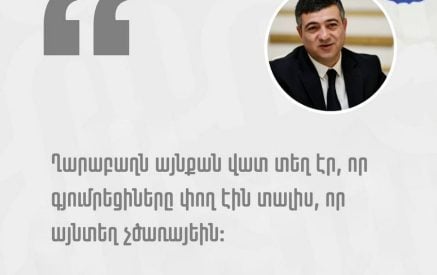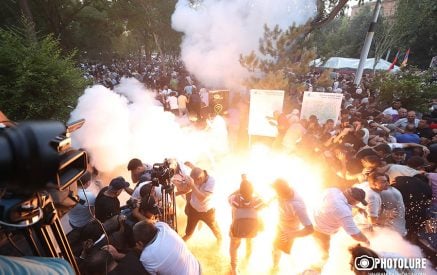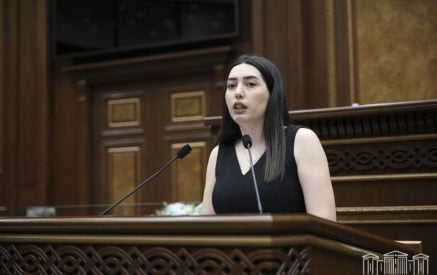Since 1999, the OSCE Office has operated in Yerevan supporting Armenia to implement OSCE principles and commitments in three – politico-military, economic and environmental and human dimensions. OSCE provided assistance to the country’s government by building the capacity of national stakeholders and by facilitating information exchange between OSCE institutions and relevant state agencies.
In the area of police reforms, the OSCE aimed at helping Armenia to transform its police force into a modern and accountable service for its citizens through rolling out a community policing concept across the country, helping to strengthen partnership between the police and the public, and training police officials on such issues as public order management, public relations, and accountability.
Since 2003-2004, when the OSCE Office in Yerevan got engaged in the police reforms and, particularly, since 2008, when its assistance focused on policing public assemblies, the Armenian people have witnessed increasingly aggressive and unlawful behavior of the policemen. In this period, hundreds of thousands of citizens have been deprived of their right to peaceful assembly and many hundreds were illegally detained and suffered physical offenses.
The latest events, following the armed attack of a group “Sasna Tsrer” on the patrol-guard service station of the Armenian police located in Erebuni district of Yerevan on July 17 2016, recorded the peak of violence of the police troops, largely reminding the operations of this institution on March 1-2 2008, when the protests of the Armenian citizens against the rigged presidential elections were cracked down. “Sasna Tsrer’s” demands are the release of political prisoners and the resignation of the president of Armenia. These demands are largely shared by people, who are upset with the widespread corruption, social injustice, poverty and emigration, and the impossibility to change the governance system given the continuously rigged elections. Many people consider the uprising to be the last resort to save the country’s future and, hence, a growing number of people join the civic actions in defence of the rebels.
Read also
In response to the peaceful acts of the supporters of the rebels’ demands, the Armenian police demonstrated disproportionate force and violence. The police were equipped with shields, truncheons and guns, and additionally used stones, tear gas and stun grenades against unarmed citizens. They utilized tactics to provoke peaceful protesters, damaged and confiscated the property of sympathizers of rebels, used intimidation techniques and cursing, conducted physical attacks and severe beatings, tortured and humiliated the detained persons. Hundreds have been detained without due justification and jailed for hours without food and medical aid. Dozens were injured and hospitalized – both citizens and the policemen. Live broadcast of the events and all the video recordings are more than enough to confirm the use of excessive force by the police in Erebuni district, on the Freedom Square as well as in the apartments of the rebels or their colleagues.
The institution of police is supposed to protect the people by ensuring the rule of law and public order, meanwhile in Armenia it has turned to an enormous punishing structure that uses arms against the unarmed citizens protecting the authorities and their political or economic interests, executing their illegal orders and cracking down democratic processes. The budgetary and extra-budgetary expenditures of police forces have increased by more than 5 times from 2007 till 2015. The inflation of volumes of the police personnel and modernized armament, regular practice of using disproportionate force, lawlessness of police officers and their impunity has made Armenia a ‘police state’ to an extent that in the background of silence of all the governance structures during the events of the last days, the police seemed to be the only operating institution, and, hence, charged with the jurisdiction of resolving of all issues in their ‘own’ way.
The above-mentioned situation naturally raises a number of questions before international institutions that provide assistance to the country’s police and, particularly, the OSCE Office in Yerevan. Specifically,
- Since 2008 how much assistance was provided to Armenia for turning its police into a modern and accountable institution and improving of the quality of the community police and was there any evaluation of the level of efficiency of its implementation?
- To what extent does the current performance of the Armenian police structures correspond with the OSCE’s values of security and policing and the aimed reforms?
- To what extent are the spent resources considered to be effective given that the mode of police actions has not recorded any change since 2008?
- What is the OSCE’s opinion on the enlargement of Armenia’s police establishment and the emerging ՛police state՛ and what steps have been taken to prevent such a development and to ensure compliance of this institution to democratic principles?
By and large, it is obvious that the efforts made by OSCE as well as other international organizations to reform the police sector in Armenia has failed.
In this context, we urge that all the international assistance to this sector is suspended until there is serious reconsideration of the role of the police within Armenia’s governance system.
Transparency International Anticorruption Center NGO






















































